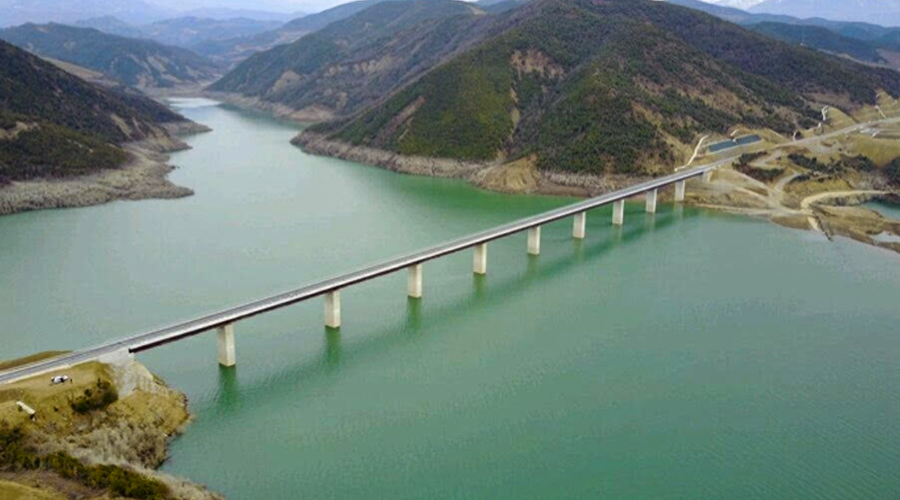
Established in 1995, Albstar has become one of the biggest companies in Albania in engineering services, waterworks, transportation infrastructure, and civil as well as industrial projects. Present across the country and in neighbouring nations, Albstar has experience working with international partners such as the German banking group KfW and the government of the Netherlands, a fact that ensures the company works to global standards. Albstar is now completing an ambitious project, the Arena Kombëtare football stadium in Tirana, which will be home to the Albanian National Team
What have been the main milestones of Albstar since its creation, and what projects are you most proud of?
We started out doing work in water supply, sewage systems and pipelines, and slowly we started building roads. At that point we split the company, creating another company for steelworks and other for industrial construction called APM. The Albstar Group now comprises ASAB, APM, VIBTIS and AOS, and covers a broad range of projects in infrastructure, water supply systems and civil works. Our international activity began with foreign investment partnerships and European Community projects. We’ve done a lot of work with German partners and worked extensively in Kosovo and Montenegro. We have built roads big roads for Albania’s major industries, such as oil and energy. With Norwegian hydropower company Statkraft we built a large bridge, 600m long and 54m high. It was a great experience working under their guidance.
What stage of development is the football stadium at?
We are completing this important project, Arena Kombëtare, in a public/private partnership (PPP) with the Albanian Football Association. It started out as a €45-million project but is now costing close to €70 million. If we were doing this in the European Union, it would cost over €140 million. The stadium will have seating for 22,500 spectators and it is in a good location with lots of surrounding businesses and hotels. We are proud of this project, which is being carried out by Albanian specialists with support from Italian architects.
What will it represent for the country to have this stadium?
I think this will be one of the best stadiums in Europe. It is being built to high standards, inside and out. We have already been complemented on it by architects who have visited Albania. Inside there will be a museum, and nearby there will be shops and entertainment options. There are also plans to use the stadium for concerts.
How would you describe this current moment in history for Albania and the renewal of its urban spaces?
There are big changes going on. The government is focused on changing the face of Albania through investment, not only in the capital Tirana but also in other cities. It’s a great idea because people can now spend more time in the cities, they are nicer places to be. There is still a lot left to do, but Tirana has seen a lot of positive change.
You’ve worked with the German banking group KfW, and this has helped you build your capacity. How do you see Germany as an influence on the country?
German investments, especially by KfW, have been instrumental for the company. KfW’s projects for sewage treatment plants and water supplies are of very high quality, and it has done a lot of work here in Albania. KfW’s supervision is very important, it has shown people how to work to international standards. Our people have learned how to work to higher standards with very little increase in our costs. After raising these standards, we were able to take on other projects with foreign investors like Shell and Statkraft.
What would you say about Albania and your company to foreign investors?
If they come looking for local partners, at first they might be suspicious of Albania’s international image. But when they come and see what we have done with foreign companies and investors, this provides them with comfort. This company produces a lot of products for Europe, like wind power towers for Italy and Japan. We have done a bridge in Manchester and vessels for Shell. We are growing our company because there are a lot of requests for high quality products at a competitive price.
How do you build Albanian capacity?
If we can find the labor here, we hire it, but for big projects we also hire abroad. For example, we have hired specialized welders from Colombia, Turkey and Thailand. However, 90% of our workers are Albanian. By bringing in outside specialists we also contribute to training the Albanian workforce and creating a new generation of skilled workers, which is to our own benefit.
After finishing the stadium, what is on the horizon for Albstar?
We have a lot of capacity for road building; we have some contracts with the Albanian Development Fund, and we are collaborating with an Italian company. In the future we will focus on building PPP toll roads. Our other major goal is to grow our APM construction company to increase our capacity for this kind of work. Our market is small, so we need to be diversified, and we have managed this diversification satisfactorily. We now have a holding company, Finman, that holds Albstar, APM and the rest of the business units, and we are busy with many projects. We are happy with the way things are working.